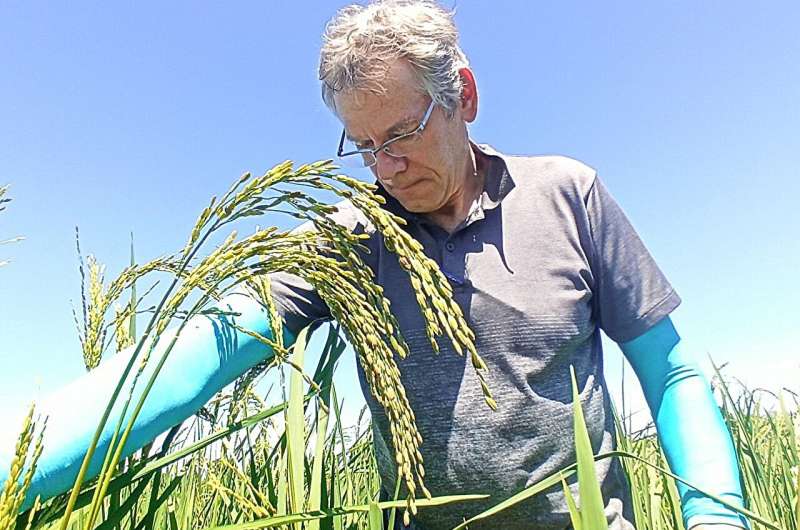This article has been reviewed according to Science X's editorial process and policies. Editors have highlighted the following attributes while ensuring the content's credibility:
fact-checked
trusted source
proofread
New rice variety adapted to suit conditions in Madagascar—improved phosphorus absorption and increased zinc content

A new variety of rice that is adapted to life in low-phosphorus soils, that contains an exceptionally large amount of zinc and that was developed specifically for the conditions in Madagascar where it is grown, has recently been certified in the country.
The variety was created under the leadership of plant scientist Professor Matthias Wissuwa from the Japan International Research Center for Agricultural Sciences (JIRCAS) and the PhenoRob Cluster of Excellence at the University of Bonn which he joined as a visiting professor in spring 2023, together with the Africa Rice Center and the National Centre of Applied Research for Rural Development in Madagascar (FOFIFA)
Professor Wissuwa's research focuses on developing plant varieties with improved nutrient use efficiency and stress tolerance, specifically on abiotic stress factors such as phosphorus deficiency, iron toxicity, drought and salt stress. His research team makes targeted use of genetic resources from gene banks all over the world to harness the natural genetic variation present in old traditional cultivars for its stress tolerance research and to apply its findings to modern, high-yield varieties.
One property in particular was a priority when creating the new variety, known as Mavitrika. "The variety was developed specifically to strive in low-phosphorus conditions, because Malagasy soils contain very little of it," Wissuwa explains. "However, plants need this essential nutrient for growth and development."
The aim was for the new variety to be both better at absorbing phosphorus from the soil and to use it more efficiently. "The new rice variety we have developed is ideally suited to the conditions in Madagascar. Having larger and more efficient roots allows it to take up more phosphorus and that increases yield."
Wissuwa points out that the new variety also boasts improved nutritional value, most notably thanks to a higher content of the important micronutrient zinc in the grain.
Mavitrika is the first zinc-biofortified variety to be approved in Madagascar. "Zinc deficiency is common among the Malagasy people, and rice—which is their main staple—will be able to combat this deficiency if its zinc content is increased," says Professor Gabriel Schaaf from the department of Plant Nutrition at INRES and member of the PhenoRob Cluster of Excellence who was involved in the determination of zinc in the grain.
Successful test under real-life conditions
"One unique feature of the experiments including cultivation and phenotyping was that, rather than taking place on the research institutes' test sites, they were actually grown and selected directly on the farmers' fields," says Professor Wissuwa.
With the new zinc-biofortified rice variety proving successful under these real-life conditions, it has now been officially released in Madagascar—specifically at a formal ceremony held on March 21, 2024 in the presence of the prime minister Christian Louis Ntsay and ministers of Agriculture, Ratohiarijaona Rakotoarisolo Suzelin, and higher education, Razafiharison Andriamanantena.
"Matthias Wissuwa is playing a significant role in studying nutrient acquisition, notably as part of the PhenoRob Cluster of Excellence," says its Speaker Professor Heiner Kuhlmann. "Our shared vision is to transform crop production and optimize it by developing and deploying new technologies, and the licensing of this rice variety will benefit society enormously."
Provided by University of Bonn





















